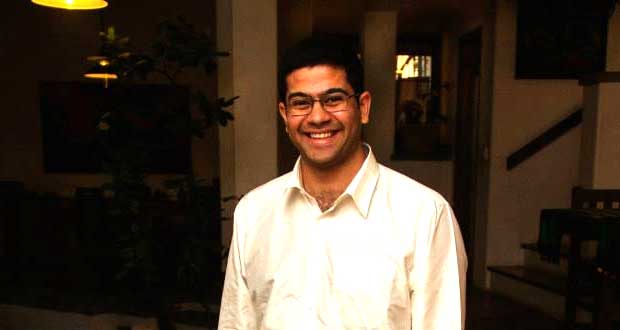Manveen Singh graduated from UILS, Panjab University, Chandigarh, in 2012. He then went on to pursue his Masters from UCL in Intellectual Property Law. He is currently working as a Research Associate at Jindal Global Law School, Sonepat . He enjoys teaching and plans to pursue a PhD in Patent Law (Intellectual Property) this fall.With six international participations, nine internships, five research papers, one book chapter, sixteen national conferences, he was an extremely hard working, consistent and brilliant law student.
In this interview we speak to him about:
- Studying abroad
- The legal education regime in India
- Pursuing a future in academia
Tell us something about yourself.
Well, I am someone who is very honest, emotional and passionate about everything I do. I am a firm believer of destiny and I also believe that if you have your heart set out on achieving something there is absolutely nothing that can hold you back.
What truly unwinds me is football. Manchester United is well, the love of my life. Besides that I love travelling, reading and listening to music. One thing that has always given me peace is photography.
When and how did you decide to pursue law?
Before joining law, I was basically a science student. However, my shifting from science stream to humanities was purely co-incidental with my father’s taking up a prestigious assignment as the founder Vice-Chancellor of one of the reputed National Law Schools of the country. Though my father never wanted me to study directly under his supervision and stewardship, lest it could affect my independence and academic blossoming, his constant hammerings for my understanding of the basic concepts of law and for an in-depth study and critical analysis of some of the legal doctrines nevertheless inculcated in me the strong and never ending desire for taking up legal studies as a means to embrace the ever challenging and exciting career in the field of law, the decision that I feel proud of having taken when I sit back and reflect pensively
Tell us something from your days at UILS!
I have very fond memories from my time at UILS and Panjab University. My graduation from such a reputed university, rather the best Indian university in the world (as we may call it now, based on the latest rankings) and my five year long and close association with some of the most committed and dedicated teachers showing paternalistic interests in me inculcated in me the never ending quest for more and more knowledge. I was always an active participant in all the legal as well as other academic events that took place at UILS and the University and not to forget, good in studies too.
Besides that, college life gave me friends, friendships and more that shall stay with me for the rest of my life.
What made you pursue your LL.M in the UK?
I always wanted to go abroad for my post-graduation; the only dilemma being whether to go straight after law school or work for a year or two and then go. It was not until I entered into the final year of my undergraduate degree that I made up my mind and applied to all the top universities in the UK. My parents and teachers were unanimous in their advice to the effect of my going in for my masters straightaway.
For me it was always going to be the UK over the US. Also, my father did his PhD. from the UK so there was always that connection and motivation towards handpicking UK over other countries.
I applied to a number of UK universities including University College London, King’s College London, London School of Economics, Queen Mary University of London, School of Oriental and African Studies (SOAS) as well as University of Oxford. I got through to all of them with the exception of Oxford. I had my heart set on UCL and as destiny would have it, UCL it was.
How should one zero in on the law schools? Should consideration be paid to living expenses in that particular place?
There are multiple factors that you need to take into consideration while zeroing in on the right law school. Ranking, of course plays its part but besides that you have to be sure of the area you wish to specialize in, whether that university offers you that specialization and lastly, the concerned faculty. As far as the living expenses are concerned, when you pick a country there is not too much difference in terms of the living expenses within the different cities. On that front you would rather adhere to the overall profile of a university and then come to the advantages of being in a particular city.
Tell us about the course structure and specialization of Master of Laws at University College London?
Well, UCL offers you the chance to specialize in a whole lot of areas of law. I personally, have always been very fascinated by Intellectual Property Laws so one of the reasons behind my choosing UCL for specializing in IPR was the fact that the Faculty of Laws at UCL has arguably the best IP faculty in the UK.
How diversified was your batch at UCL?
Well, my batch at UCL was one of the most diverse ones out there. The quest for learning bringing together all these people from different parts of the world to brainstorm and share their ideas and expertise in the various fields.
Most of them are now back in their own countries plying their trade while some of them stayed back in the UK as they were hired by some of the Magic Circle law firms. Some even made it to the UN.
Do you think that nowadays, some students do an LL.M because it seems the “right thing to do” and not because they know what they want to study or why they want to?
Well, to be honest, I don’t really subscribe to that view of it being the “right thing to do” or not. At the end of the day, it’s a matter of choice whether or not one wants to go in for his/her masters. If you’re up for it, just go for it. There’s no looking back.
I would like to add a quote here, “If you force yourself to go outside, something wonderful always happens”.
What do most foreign universities look for among candidates?
Most foreign universities require a well drafted SOP and a couple of LORs besides good grades.
What is the key ingredient of a well written SOP?
A well written SOP is one which truly reflects your thoughts and intentions behind pursuing a master’s degree and how it is going to be beneficial for your career interests. You can, of course make it personal but the language must be formal. One thing that is highly appreciated by foreign universities is community work. Surely, that has got to be one of the key ingredients of an SOP.
An honest tip to those making their SOPs would be to be as honest as possible and not cook up things or achievements. That’s the most common mistake people tend to make which has more chances of landing one in trouble than not.
Do you think that having your recommendation letters written from distant acquaintances with influential position may backfire against you while making your application?
Essentially, every foreign university requires two academic LORs, preferably from the professors who have taught you during your undergraduate degree. In addition to that any other LOR is considered as a supplementary document and the role it would tend to play in the success of one’s application is very subjective and depends from university to university. So there is not too much you can do with the standard established protocol.
How do you think one should go about their chances of securing a scholarship for an LL.M program?
Securing a scholarship at a foreign university is one of the first and foremost things that every Indian student tends to look at and with the cut-throat competition out there, it has become more of an uphill task in recent times. Good grades coupled with practical internships and community work is the key to securing a scholarship for an LL.M. program.
UCL has quite a few categories of scholarships available to students all over the world. If we talk about the scholarships for Indian students at UCL, there are two awards; one being the Master of Rolls Scholarship for Commonwealth Students (one award for a student from the commonwealth nations) and the Chief Justice Scholarship. I was a proud recipient of the former for my LL.M. studies at UCL.
What are the criteria for an LL.M graduate to enter the teaching profession in India?
The minimum basic requirement for entering into academia is a master’s degree. Most of the universities require you to be NET qualified while at the same time there are some that allow you clear it while in service.
How are you going ahead with the PhD application procedures?
Yes, I wish to start off with my Ph.D. as soon as possible and shall put forward my candidature at various universities as soon as the applications open this fall.
Describe your teaching style.
I would say it comes to me naturally since it runs in the genes. My father is an academician and so was my grandmother. Now that I look back and try to find the inspiration behind my joining academia, I would have to give a major chunk of the credit to my friends since I taught a few of them during my university days and they would always encourage me by telling me how good I was at it.
One thing I still can’t forget is the fact that I taught a friend of mine and he outscored me in one of the semesters. I think that did it for me.
Well, I am someone who tries to give his 100% in every lecture while at the same time try to get the best out of the students. Not every student is the same so my endeavor always is to reach out to every student and make them comfortable with the subject that I’m teaching.
I try to use as much of practical and real life examples as possible besides the conventional theoretical methodology in order to make every lecture as interesting as possible. Although I give my students PowerPoint slides for every lecture but while teaching I want them to listen to what is being taught for I think that is the only way for them to master the concepts.
What do you like best about teaching at JGLS?
There are a couple of things that I like about JGLS. Firstly, I feel that the academic freedom you possess as a teacher and more so as a young faculty member is something that is very important. JGLS gives you that freedom and so much so that the only way you can repay it is by doing full justice to your job. That is something I cherish day in and day out.
Secondly, it’s the students. They just get the best out of you as a teacher. Every day is like a new challenge for me. There are so many things that you as a layman would not be inspired to read or write on but the ideas that flow from classroom teaching are unparalleled. If the students are smart and intellectual, it will inevitably push you to give your best as a teacher and I think that is one thing I like the most about the students at JGLS. The sense of satisfaction that you derive out of standing in front of 60 students and delivering a good lecture is absolutely priceless
I have been teaching for close to ten months now; all of those at JGLS.
Which subject(s) do you teach?
I have only taught a couple of subjects as yet; Labour Law being one of them. I am mostly interested in commercial and criminal law subjects. The one subject that interests me the most is of course, Intellectual Property Law (IPR) since that is the only subject that keeps me connected with science while at the same time being a commercial law subject. I shall be teaching Law of Evidence next semester and I am already looking forward to it.
After your experience abroad, why do you think LL.M in India is a little less sought after?
I think it flows from the fact that the two systems are quite different. Firstly, the biggest reason for students preferring to go abroad for LL.M. was in India being a 2-year degree. Secondly, the overall structure, the breaking down of the modules, the style of teaching and the tutorial system are so different from that in India that it is quite difficult to compare the two.
Do you think legal education in the country needs an overhaul?
I don’t think there are any drastic changes that need to be made in the existing system but something that can surely be done is to change the conventional orthodox system of legal education and adopt a more practical approach or rather strike a fine balance between the two and enable the students in competing with their contemporaries from around the world.
Do you opine that law schools have become largely expensive?
Yes, I do think some of the new law schools are relatively expensive as compared to the traditional universities but at the same time, I strongly believe that the kind of exposure and the opportunities that one would get at some of these privately funded or national law schools is incomparable to that being offered by the traditional universities.
What would be your message to our readers?
For those of you who are really keen to pursue an LL.M from abroad, remember what I earlier wrote: ‘If you force yourself to go outside, something wonderful will always happen.’ It’s a new and different exposure to behold. I wish all the very best to others in their endeavours.
























